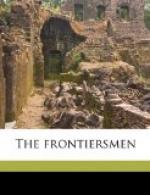He hesitated, letting the butt of his gun sink to the ground. She seized the weapon promptly. She would stand guard here till he returned, she promised. The prisoners were bound. They could not move. It would require but an instant’s absence,—and the powder was so scarce, so precious!
The next moment the sentinel was gone! The darkness descended, doubly intense, after a succession of electric flashes; the rain fell with renewed force. MacVintie suddenly heard the babbling whimper quite close beside him, somewhat subdued by a fierce maternal admonition to listen to the terrible voice of the Oo-koo-ne-kah, coming to catch a Cherokee cry-baby!
A stroke of a knife here and there, and the two prisoners were freed from their bonds. The Highland soldier did not know whether Attusah looked back while in flight, but his last glimpse of the Cherokee town of Citico showed the broad glare of lightning upon the groups of conical roofs in the slanting lines of rain; the woman on the high mound at the portal of the council-house, with the pappoose on her back and the gun in her hand; the sentinel once more climbing the ascent to his post. And the last words he heard were chronicling the adverse sentiments entertained toward bad children by the Oo-koo-ne-kah, the mysterious great white owl.
The escape was not discovered till the next day, and was universally attributed to the magic of the ada-wehi. Even the sentinel himself doubted naught, having left a trusty deputy in his stead, for the devotion of the Cherokee women to the tribal cause was proverbial, and gratitude, even for a rescue from starvation, is not usually an urgent motive power.
Kenneth MacVintie was seen again in the Cherokee country only in his place as a marker in the march of his regiment, and as he was evidently exceedingly desirous to permit no one to incur penalties for his liberation, his officers spared him questions concerning his escape, save in a general way.
When the ada-wehi next reappeared in a remote town of the district and was sedulously interrogated as to how his freedom had been achieved, he threw out his right hand at arm’s length in his old, boastful, airy gesture.
“Cheesto kaiere!” (An old rabbit!) he exclaimed. “A little old rabbit ran down the slope. I turned the soldier into a rabbit, and he ran away. And I turned myself into a fish, and I swam away. Ha! Tsida-wei-yu!” (I am a great ada-wehi!)
THE FATE OF THE CHEERA-TAGHE
Along the old “trading-path” that was wont to wind from the Cherokee country among the innumerable spurs and gorges of the Great Smoky Mountains, and through the dense primeval forests full five hundred miles to the city of Charlestown, was visible for many years, on the banks of the Little Tennessee, an “old waste town,” as the abandoned place was called in the idiom of the Indians. An early date it




